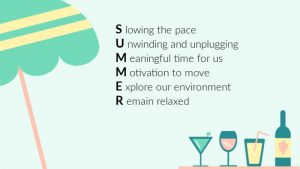by virtualworks | Apr 14, 2024 | Accomplishments, daily lfe, Mastery, Productivity, Time Management
 Who doesn’t have a ‘bad’ day?
Who doesn’t have a ‘bad’ day?
We all do sometimes, and these days it seems like there are a lot of them. A recent bad day was experienced by a friend of mine, let’s call her “R”. Picture this:
After a restless night’s sleep, “R” wakes up with an incredible headache and stumbles along getting ready for the workday ahead. With no hot water left for a shower, a broken hairbrush and tangled necklace (and not one, but two, dropped cups of coffee), she managed to still get herself ready for the day. She realizes what she thought was 8 am, was actually 9 am and she was already running late for work. The rest of the day became a blur of things just not going right. It is safe to say “R” was having a ‘bad’ day.
There are some common causes for a bad day: The list below is not exhaustive of the causes of a bad day, but they are common to many.
- Lack of Sleep (like our friend above): not getting the right amount of sleep can be a contributor to stress and poor health.
- The Presentation of Negative Information: we are bombarded by the news, social media and negative people providing negative information that can be overwhelming.
- On-going issues that last a while: there may be past negative experiences that still have a current impact that needs to be dealt with.
- Upsetting events just happen: things just happen and they will have an effect on your day.
Relativity of Problems:
It’s important to recognize that people come from different places and their lives are based on different events they experience. As a result, we all have different levels of what people consider a problem that causes a bad day and it is important to not discount the struggles of others even if we don’t understand their struggles as a problem.
Tips to get through it: So, let’s try to get through that bad day with the following ideas:
- Take a moment to just breathe. Stop the bad day in its tracks.
- Do some things to make you feel better like taking a relaxing bath, have some tea, go for a walk or meditate.
- Understand the cause of the bad day and determine if these are things within your control. If they are, make the change that is needed and if this is not in your control do your best to let it go.
- Journal those things that are causing your bad day as a way to express your emotions or speak with someone to ask for help.
If you’re interested in trying a few other methods to get through a bad day, check out tinybuddha.com’s article on how to turn around a bad day in 10 minutes.
by virtualworks | Mar 3, 2024 | Accomplishments, Business, business growth, daily lfe, Leadership, Mastery, Productivity
 Whether in business or in our personal lives, we’re constantly striving to find something, to do something, or to complete something leading to an achievement or accomplishment and we measure how successful we are against the ability to reach these goals. Many times, we’re so busy looking ahead to how we can achieve these goals, we often forget to reflect on what we’ve already done and we may only be recognizing professional achievement and not the day to day ‘stuff’ that this wide ride called life can throw at us.
Whether in business or in our personal lives, we’re constantly striving to find something, to do something, or to complete something leading to an achievement or accomplishment and we measure how successful we are against the ability to reach these goals. Many times, we’re so busy looking ahead to how we can achieve these goals, we often forget to reflect on what we’ve already done and we may only be recognizing professional achievement and not the day to day ‘stuff’ that this wide ride called life can throw at us.
A colleague told me a story of how one of her friends was completely down on himself, feeling like he hadn’t accomplished anything. While he admitted this was an extreme way of thinking, to not have accomplished ANYTHING, he couldn’t shake the feeling that he had not yet done anything with his life, as he was in his mid-thirties, had never been able to buy his own home and did not have a solid career nailed down, nor did he have any idea what his career was. However, he had been married for 15 years, with three almost grown, respectful children and he took care of his parents and grandmother when he could. She pointed out what he had already accomplished but this didn’t resonate as actual accomplishments to him. But why?
When we fail to recognize what we’ve done in our lives as a whole, we may be denying ourselves that feeling of accomplishment, which gives us that little motivation boost to go further to achieve the goals we set out to do.
It comes down to how we measure success, and we all do it differently. These differences can stem from our upbringing, our personal and professional experience, our current societal norms, numerous other factors, but one thing remains: for the most part, we want to be successful and we each have a measure in our mind of what this is. Forbes magazine has given an indication of how one should measure success, and that all starts with YOU, in terms of what success represents, how it is measured in your state of mind, and that it is for YOU to measure an no one else. So the first question is: How do YOU measure success?
Success comes in many forms, small to large, professional and personal and it’s a good idea to know where you are at with respect to your own larger goals, because each little step further towards and overarching goal is an accomplishment in and of itself. If I said I want to be a psychologist so I can help people, this is a very broad and very big goal. The chance that I may not accomplish this larger goal is fairly likely, but that should not be a deterrent for trying or enjoying the path to get there. Each course passed towards a psychology degree, each article read and understood and each opportunity to rest and let the information connect is its own accomplishment.
So, why not celebrate what you have managed to do, to provide the fuel to your motivational fire?? If you’re still focused on those larger goals, Psychology Today as a short article on steps to achieving those goals and remember to enjoy the road to get there! So, take it easy on yourself, give yourself a pat on the back for what you’ve been able to do and you will move on to do more.
I’ve successfully written this short article.
Now it’s your turn to do something amazing!
by virtualworks | Jun 20, 2023 | daily lfe, Mastery, Time Management, Uncategorized
 Summer officially arrives tomorrow, Summer Equinox and the longest day of the year. Some of us may head off to the beach or a cottage, some may be working in the heat of summer, while still others may be getting comfortable near a fan. As noted in the acrostic above, summer is an opportunity for us to do a few things to keep ourselves calm and relaxed as we unwind this summer.
Summer officially arrives tomorrow, Summer Equinox and the longest day of the year. Some of us may head off to the beach or a cottage, some may be working in the heat of summer, while still others may be getting comfortable near a fan. As noted in the acrostic above, summer is an opportunity for us to do a few things to keep ourselves calm and relaxed as we unwind this summer.
Slowing the pace
By taking the time to stop what we’re doing, or interrupt the daily cycle to listen, take a breath and live in the moment, even for just a minute, we can gain tremendous benefits such as lowering stress levels, lowering our heart rate and improving our mood and psychological engagement. Lifehack.com has a list of ways to slow down in a fast-paced world.
Unwinding and unplugging
Try going a day (or longer) with no technology, the magic of un-plugging. That means no phone, no television, no media of any kind. Instead, why not try taking a relaxing bath, read a good book (made from an ancient fibre called ‘paper’), playing music or painting, or any other activity one would consider “old school”. By taking note of how you feel at the end of the day or more with no technology and noting if you had an unwound day without it. Getting in touch with some of the old ways of doing things can make a difference in one’s day and it can actually help you feel mentally refreshed. A colleague mentioned when she needs to unwind, she bakes some bread but doesn’t use machines to make it. Just a bowl, spoon and her two hands. She swears by it as a stress reliever.
Meaningful time for us
Don’t feel guilty about taking some much-needed quality or meaningful time out just for you. How we define that time may be different for everyone. Perhaps it means to be alone to collect your thoughts without interruption, or it may mean making time for family and friends. Just remember to not feel guilty about taking that time back but if you need some convincing on why it is important to take the time for yourself, Psychology Today runs through a few reasons to not feel guilty about solitary time for you and Time.com talks about the importance of meaningful time with those around us.
Motivation to move
So far, we have talked about slowing down, unplugging, unwinding and taking time for ourselves. This all sounds pretty relaxing, but what about the importance of getting up and moving? While this almost feels counter-intuitive to the strategy of relaxing, exercise can make that relaxation all the more impactful by adjusting our body chemistry to reduce stress and boost mood, allowing us to better make use of our previously discussed methods for relaxation, as mentioned in Harvard Health. Alternatively, if the heat has got you down, taking a dip in the nearest pool or lake is another great way to stay in shape.
Explore our environment
While you’re getting up to exercise, why not take it outside. It’s summer after all! This gives you a wonderful opportunity to mindfully take in nature within your neighbourhood, or local trails. In our busy days, we don’t always get to take in the beauty of our environments.
Remain relaxed
Finally, some days just feel like chaos rests at the top of our minds. This is the perfect chance to try some meditation exercises to quiet the chaos, reduce stress and bring us back to that place where we can once again enjoy a slower pace by unwinding and making our summer a meaningful one.
Have a wonderful summer everyone!
by virtualworks | May 22, 2023 | Business, business growth, Leadership, Mastery, Productivity, Time Management, Uncategorized, working from home, working remotely
 Outsourcing of services is becoming more and more mainstream and with the abundance of former corporate workers who have vast knowledge and experience and now run their own businesses, you will likely be able to find someone to help you for a reasonable amount of money. Just as business owners can operate from just about anywhere, resources can provide services from anywhere. But whatever your needs are, always remember: “buyer beware”!!
Outsourcing of services is becoming more and more mainstream and with the abundance of former corporate workers who have vast knowledge and experience and now run their own businesses, you will likely be able to find someone to help you for a reasonable amount of money. Just as business owners can operate from just about anywhere, resources can provide services from anywhere. But whatever your needs are, always remember: “buyer beware”!!
Here’s a few things to consider when outsourcing:
- The lowest priced outsourced solution may not be the best; good people cost money and beware that even these days, you still get what you pay for.
- If you’re just starting out, outsource from the very beginning with a Virtual Assistant and a bookkeeper and grow your team from there. As your business grows, you can take on a web designer, a ghost writer, a graphic designer, an executive assistant, a project manager, etc.
- Don’t outsource a task just because you don’t want to do it. There will be tasks that only you can do because they’re important to operations and strategic plan.
- Always strike a fair deal with your resources and treat them with respect. You’re relying on them to handle important tasks for you and your business so don’t take advantage of them.
- Bartering. This is a great way to get things done for no cost in exchange for services. Make sure that you and the resource are clear about the terms and that the services you each provide are both what you want. Beware that this mode of payment isn’t for everyone.
On the personal side of your life, you might think about outsourcing to further free up your time:
- A personal assistant to help keep you and your family organized;
- Housekeeper/house cleaning service;
- Property maintenance;
- Grocery service, errand service
When I first started my remote support agency, I thought I would lay-off my housekeeper, thinking that since I would be working from home, I could manage the house myself. A very wise business coach I met during my early networking days advised me against it. The reason? “You’re going to be at work during the day.” She was correct, of course, and my housekeeper is still with me to this day. What are your priorities? What would make your life easier and be less stressful for you? Give it some thought!





Recent Comments